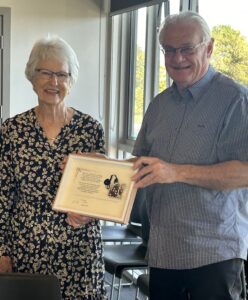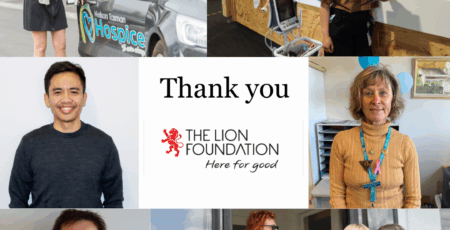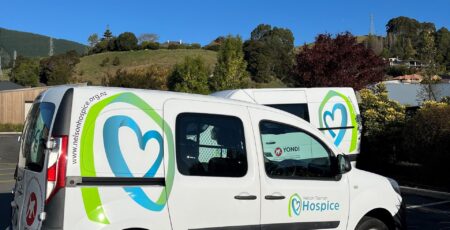We extend our heartfelt thanks to The Lion Foundation for their generous grant towards the…
10 years as a Nelson Tasman Hospice Trustee come to an end
Carol Gowan joined the Nelson Tasman
Through her work experience she has brought knowledge and skills in human resource management, mental health services, health administration and governance. Contributing to the community has always been important to her, and she has been involved with and taken a leading role in several community organisations over the many years she has lived in this region. Carol has a long-held interest in arts and crafts and is currently editor of the magazine of a national arts society. We took the opportunity to ask Carol a few questions about her time on the board and what might come next.
Why did you originally become a member of the Nelson Tasman Hospice Operational Trust?
I became a Trustee because I was approached and asked if I’d be interested. I really had no knowledge of the Hospice prior to that although I had known of its existence due to having worked at (what was later called) Nelson Marlborough Health and continued an association after I left full-time employment.
What are you most proud of achieving as part of the trust?
The opening of the new building was certainly a major milestone in my time as Trustee, and it was interesting and rewarding to be part of that journey,
but I don’t really see myself as having “achieved” anything on a personal level. I was part of an important team, and I took that role seriously, but we were there to make collective decisions rather than to do things individually.
What are the biggest changes you have seen over your time serving on the trust?
The changes over the past 10 years have been huge: the recognition that the Hospice has an important part to play in the community, the recognition that palliative care is a specialist service and needs to have specially trained clinical staff (eg. hence the appointment of a specialist medical director and specialist nurses, and the Hospice’s role in teaching people employed by other health service providers), the broadening of the services provided to patients and whānau (eg. social work, clinical psychology, counselling, occupational therapy etc), the decision to build new premises and all the fund-raising and community involvement that was required, the establishment of a professional supporter engagement and income development team, the continual work to get better and more relevant data on everything for better decision-making, the growth of the volunteer workforce and recognition of the important contribution that this group makes. Ten years is a long time to remember all that went on so I may have left out a few important things.
What are the most common misconceptions about hospice that you have come across when people find out you are a trustee?
I don’t think I have come across misconceptions but perhaps a misunderstanding. The Hospice is more than just a building and an inpatient service, where people go to die. Many people have been given excellent palliative care services by the Hospice, which supports them within their own homes or a residential facility in the last stages of their lives. I have always been very impressed by the generosity of the community – both individuals and businesses.
We would like to thank Carol for her years of service to Nelson Tasman Hospice as a volunteer on the Operational Trust and although Carol is resigning from her position as a trustee, she remains committed to supporting hospice via a regular donation.




It was an absolute pleasure working with Carol during my time as CEO. I wish Carol all the best going forward.